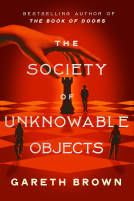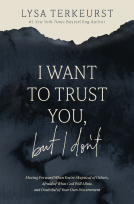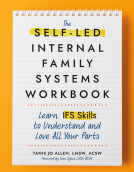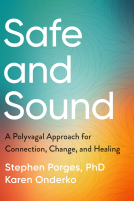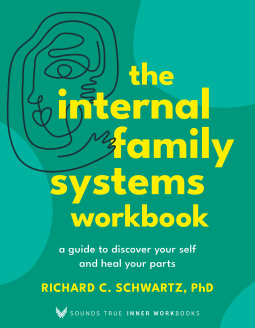
The Internal Family Systems Workbook
A Guide to Discover Your Self and Heal Your Parts
by Richard Schwartz, Ph.D.
This title was previously available on NetGalley and is now archived.
Send NetGalley books directly to your Kindle or Kindle app
1
To read on a Kindle or Kindle app, please add kindle@netgalley.com as an approved email address to receive files in your Amazon account. Click here for step-by-step instructions.
2
Also find your Kindle email address within your Amazon account, and enter it here.
Pub Date Dec 03 2024 | Archive Date Jan 03 2025
Sounds True Publishing | Sounds True
Talking about this book? Use #TheInternalFamilySystemsWorkbook #NetGalley. More hashtag tips!
Description
The only official workbook from Dr. Richard C. Schwartz, founder of Internal Family Systems, to meet, understand, and heal the parts of yourself
The Internal Family Systems (IFS) model teaches that each of us is not a single personality. Rather, we carry in us a “family” of distinct inner parts that hold our many hurts and conflicts―and that we can heal in order to live with more confidence, courage, and connection. With The Internal Family Systems Workbook, Dr. Schwartz presents an invaluable tool to help you learn about IFS and apply it to your own life—on your own time and at your own pace.
Opening with a beginner-friendly overview of IFS, the workbook offers more than 50 practices, exercises, and meditations to help you:
• Understand the parts that make up your system, including Manager parts that want to keep you out of uncomfortable situations and Firefighter parts that react to painful emotions and events
• Extend compassion to each part as you begin to understand how they’re trying to support you
• Learn strategies to stay calm and navigate anxiety when your parts are activated, allowing you to face challenging situations with courage
• Explore ways to heal past wounds and trauma
• Uncover your core Self that is the source of your deepest wisdom
Throughout the workbook, you’ll find a variety of exercises to support different learning styles, as well as QR codes for guided audio meditations read by Dr. Schwartz to further bolster your journey.
IFS has proven to be a revolutionary tool for stress, anxiety, depression, PTSD, trauma, burnout, addiction, disordered eating, relationships, and more. As Dr. Schwartz writes, “IFS changes lives. Now it is your turn to experience this transformative tool for yourself. You and all your parts are welcome here.”
Advance Praise
“This insightful and life-transforming workbook offers practical steps to exploring the many states of mind that make up our inner landscape.” —Daniel J. Siegel, MD, New York Times bestselling author of Aware and IntraConnected
“This workbook is a valuable resource whether you’re new to the IFS model or have been using it for decades as I have. In it you’ll find helpful exercises and meditations to guide you on your personal journey of healing your parts.” —Pamela K. Krause, MSW, LCSW, senior lead trainer, IFS Institute
Available Editions
| EDITION | Other Format |
| ISBN | 9781649633118 |
| PRICE | $22.99 (USD) |
| PAGES | 240 |
Available on NetGalley
Featured Reviews
This is such an informative and helpful text! IFS is something my supervisor has trained in and we frequently use as an approach to working with teen boys in a group home setting. This book will absolutely end up on professional bookshelf full of notes and sticky notes!
 Reviewer 1493881
Reviewer 1493881
This workbook is really incredible and I highly recommend. While I don't think background knowledge in IFS is necessary because there is a lot of explanation throughout the book, I feel like this workbook is best suited alongside therapy or with some previous experience in IFS therapy sessions. As a workbook, it feels very dense, in a good way but also in a way that it feels like a life-long workbook, rather than one you could complete in a few months. I really love IFS and how it conceptualizes the psyche. It's very warm and expansive.
Thank you Sounds True Publishing and NetGalley for this ARC!
"The Internal Family Systems Workbook" has been a great find as I’m just starting counselling and trying to get back on track. I hadn't heard of IFS before, but this workbook offers a clear and helpful introduction. The exercises really encourage you to explore and understand the different parts of yourself, which can be challenging but so rewarding. The deep questions force you to pause and think, making it a powerful tool for self-reflection and healing. Highly recommended for anyone wanting to do some serious inner work.
 Leila M, Reviewer
Leila M, Reviewer
Note: Although I’m a provisional psychologist with some knowledge of IFS, I’m not a licensed IFS therapist. That said, there are common threads across therapeutic orientations. While models may differ in name or structure, they often share foundational elements. This is the stance I will review this from.
I often work with neurodivergent individuals and those with processing differences, so making experiential work like this accessible is incredibly valuable. While IFS is structured around internal parts, I see a lot of overlap with other modalities, such as Emotion-Focused Therapy (EFT), particularly in how we engage with emotions and internal conflicts. Reframing aspects also cross over with Schema and other experiential approaches for me.
The workbook offers a clear and flexible approach to exploring parts work (like Managers, Firefighters, and Exiles), which can be easily integrated into therapeutic work even outside of a strict IFS framework. The distinction between Self and parts is particularly well explained, and the exercises are adaptable enough to use with clients who may have varying levels of emotional awareness or cognitive processing capacities. The meditations and reflection prompts are especially useful for guiding clients through internal dialogues in a structured but compassionate way. Understanding of IFS is not required as it is well explained, however this is dense and obviously deals with heavy work. So, I think it is something that would best be accompanied by other therapy support or done slowly, over time.
Even though IFS isn’t my primary modality, I could easily see how these concepts might be applied within other frameworks, like EFT or general emotional deepening work—even if that wasn’t the intended purpose. In EFT, for instance, the two-chair technique helps clients dialogue between conflicting emotions, much like how IFS facilitates conversations between parts. The IFS idea of "speaking for, not from" parts could also be useful in the schema realm, allowing clients to observe their schema-driven reactions with more distance and mindfulness.
The workbook’s body-based awareness exercises, like "Find It in the Body," are particularly helpful for general emotion-deepening, and they resonate with clients who are neurodivergent or have heightened sensory sensitivities. Much like EFT’s focus on the felt sense, these exercises encourage clients to locate and explore emotions as they manifest in the body. This makes emotional work more accessible, especially for those who find cognitive approaches more challenging or who benefit from a more somatic or embodied exploration of feelings.
The section on Managers was a standout, reframing these parts as protectors rather than obstacles. This mirrors the kind of compassionate reparenting work we do in schema therapy, where we help clients integrate and heal vulnerable parts.
While IFS is not my primary modality, this workbook would be highly effective for self-guided work or in therapy sessions, offering a useful structure for clients and therapists alike. It serves as a bridge to exploring internal conflicts and fostering self-compassion, whether you’re using IFS explicitly or adapting its principles to other therapeutic models.
Ultimately, this workbook offers a valuable resource for those looking to make experiential work more flexible and accessible across different therapeutic contexts. It’s a great tool for promoting self-compassion and emotional exploration, no matter the framework you’re working within.
Thank you to NetGalley, the author Dr Richard Schwartz, and the publisher for providing this ARC copy in exchange for an honest review.
 Reviewer 707034
Reviewer 707034
This is an amazing resource. I have had a passing familiarity with the Internal Family System model and this book is a clear and comprehensive description with a plethora of exercises and meditations. The overview of the content described in the synopsis is so accurate and all-encompassing that it bears no repeating in a review.
As the author notes IFS is an embodied practice going beyond simply intellectual understanding and fostering a lifelong commitment to greater self-awareness and wholeness. While the content stays primarily in the psychological realm, the acknowledgement of the Self and its 8 characteristics leans into a more expansive perspective with a spiritual component. The meditations linked to the Sounds True website are a bonus.
While this may become a welcome addition to therapists’ bookshelves, I think that a lay person with some exposure to therapy or to psychological theories and practices would benefit from working with the material as well. The author does advise those readers with deep issues to seek out an IFS therapist for support and guidance with the process.
My thanks to the author, the publisher, and NetGalley for the privilege of reviewing this book. The opinions expressed in this review are completely my own.
This review is being posted immediately to my GoodReads account and will be posted on Amazon upon publication.
The IFS Workbook offers a comprehensive, in-depth look at the Internal Family Systems modality. Highly recommend for anyone in the mental health field - or even those looking to deepen their understanding of their own family makeup. This will be a resource I will look back to frequently in my practice. Thank you to NetGalley and Sounds True Publishing | Sounds True for the ARC of this book in exchange for my honest review.
 Reviewer 1416904
Reviewer 1416904
The Internal Family Systems Workbook by Richard C. Schwartz, PhD, is an excellent resource for those interested in doing parts work for themselves.
I do recommend a background in IFS knowledge of some kind, particularly other books written by Richard C. Schwartz, PhD.
This book gently leads the user deeper into getting to know themselves and their parts and learning to accept them all as valid. There are QR codes included, which lead to meditations on the Sounds True website.
I will most likely purchase a physical copy of this workbook so that I can fill it in as I go and take part in the whole experience. As a believer in parts work, I will recommend this book to others as well.
Thank you to the publisher and NetGalley for this eARC in exchange for my honest review.
 Reviewer 1226789
Reviewer 1226789
Thank you Netgalley for the chance to read this book for a fair and honest review!
IFS is *the* hot thing in psychotherapy. I found the book helpful... for me, but I'm a therapist with a beginner's level of knowledge of IFS. But I was confused about who this book was written for – the education seemed a little too simple for a layperson unless they've already read about IFS or is using it in therapy. The "beginner-friendly overview" is VERY brief, especially when concepts behind IFS can be confusing or complicated at times. I would have liked to seen more small bits of explanation or walk-through throughout the book. I agree with another reviewer that this would be best used with a therapist in session.
 Librarian 775311
Librarian 775311
WOW. I'm so glad I was given the opportunity to preview this workbook! I first heard of Internal Family Systems from a therapist about a year ago, and have had a sticky note on my desk to look into it more ever since. With only the general idea of how the IFS therapeutic model works, I was able to readily navigate the system, understand how this approach can help work to heal pieces of traumatic backgrounds, and how to help "family members" of the human core begin to work together rather than in conflict. As someone with an abusive parent and conflict-filled formative years, I can honestly say I see how this approach is very therapeutic and have pre-ordered my own copy (to mark up and work through more deeply) for its release on December 3rd. Highly recommend for anyone whose "parts" (family members in the IFS system) might need some intrapersonal work, which then naturally flows to the interpersonal relationships.
My thanks to NetGalley and Sounds True Publishing for the opportunity to preview this title in exchange for my honest opinion.
 Karen G, Reviewer
Karen G, Reviewer
This is an excellent step-by-step guide to Internal Family Systems and how to apply it in your own life. I learned about IFS about a year ago and since then I've been trying to read everything I can about it. As the inventor of IFS, Dick Schwartz is the best person to guide us through the journey. The book is fully of simple explanations, exercises, journaling, charts, meditations. This is an experiential book and not something to be read in one sitting. I've been working my way through it and learning and growing so much in the process. Cannot recommend enough.
with gratitude NetGalley and Sounds True Publishing for the opportunity to preview this title in exchange for my honest opinion.
 Reviewer 1376260
Reviewer 1376260
The Internal Family Systems Workbook is a comprehensive and practical guide to understanding and healing through the IFS model. Dr. Richard Schwartz provides clear explanations of complex psychological concepts, making this workbook a valuable resource for both individuals seeking personal growth and therapists looking for tools to incorporate into their practice. The combination of theory, exercises, and reflective activities makes it a hands-on guide to emotional healing and integration. It’s an insightful tool for anyone looking to explore their inner world, understand their emotional dynamics, and create a more balanced, harmonious sense of self.
What sets The Internal Family Systems Workbook apart is its combination of accessible theory and practical guidance. Dr. Schwartz explains complex psychological concepts clearly, using real-life examples to show how IFS can be applied in everyday life. The workbook offers useful tools like journal prompts, visualizations, and self-assessments to help readers connect with their inner world. While the workbook is ideal for those familiar with IFS or personal growth work, beginners may find the exercises emotionally intense and may need patience and reflection to fully engage with the material.
I am really loving these workbooks that Sounds True publishing are putting out. A great resource for anyone who is wanting to know more Internal Family Systems and to work through on their own pace. Also, a great resource for practitioners working in this space to give them helpful resources in working with clients. Keep them coming!
Thanks to Netgalley and Sounds True for the ARC!
I read the Internal Family Systems Workbook over the course of three months while also discussing IFS in therapy and found the workbook really helpful for digging in deeper and really starting to understand the method. It’s definitely not the kind of book I could read in one sitting and it felt like a journey but I learned a lot. Most helpful I think was the definitions and how clear and straightforward the workbook is written.
Thanks NetGalley and Sounds True for the arc. All thoughts are mine!
 Reviewer 1389380
Reviewer 1389380
Internal Family Systems is one of my favorite psychotherapy modalities that I want to use in my own practice as an aspiring therapist. This book is incredibly accessible to anyone who wants to apply IFS in their own lives. It comes with simple explanations, charts, exercises, meditations to follow, and encouragement! I will be taking some of these tools with me in my therapy space and in my personal life too. I consider myself very grateful to have received a copy of this book, and I highly recommend it to mental health professionals and people who are curious about the innerworkings of their mind and body.
 Connie D, Media/Journalist
Connie D, Media/Journalist
If you’ve ever wondered why your internal monologue sometimes feels like a crowded group chat, The Internal Family Systems Workbook is here to help you sort it all out. Authored by Dr. Richard Schwartz, the founder of IFS, this workbook serves as both a crash course in the groundbreaking model and a hands-on guide to applying it to your own life. IFS views your psyche as a family of distinct inner parts—Managers, Firefighters, and Exiles, oh my!—all doing their best to protect you, even if their methods can be, well, a little chaotic.
What sets this workbook apart is its warmth and accessibility. Schwartz explains the model with clarity and compassion, offering over 50 exercises and meditations to help you meet, understand, and heal your parts. Whether you’re uncovering childhood wounds, addressing anxiety, or simply trying to navigate life with more courage and connection, there’s something here for everyone. The QR codes for guided meditations add a modern touch, making it easy to deepen your practice.
This isn’t just a workbook—it’s an invitation to build a better relationship with yourself. By the time you’re done, you’ll not only have a better handle on your inner world but also a newfound respect for all the parts that make you you. Perfect for anyone grappling with stress, trauma, or a nagging sense of “What’s wrong with me?” Spoiler alert: nothing’s wrong—you’re just learning to work with your team. Highly recommended!
I am no stranger to Internal Family Systems (IFS) as it is one of main modalities that are part of my own personal therapy. I already own "No Bad Parts" and "You are the One You've Been Waiting for, so I obviously was thrilled to see an official workbook.
One of the first things I noticed was the ability to access recordings of different guided exercises. One of my favorite things about IFS is the ability to access and use the modality at any time. I've grown more and more accustomed to recognizing parts when they are activated and talking with them without the support of a therapist every time. I still highly recommend having a therapist who is trained in this work. While I have done some of these meditations before with my practitioner, it will be helpful to have them all in one spot.
I love that the book gives background without spending too much time on it, which so frequently happens in workbooks. I also enjoy different types of exercises to help learn about parts, self energy, and all the in-betweens.
This is a must buy for me.
Readers who liked this book also liked:
Jodi Picoult; Jennifer Finney Boylan
General Fiction (Adult), Literary Fiction, Women's Fiction
Tanis Allen, LMSW, ACSW
Health, Mind & Body, Self-Help

